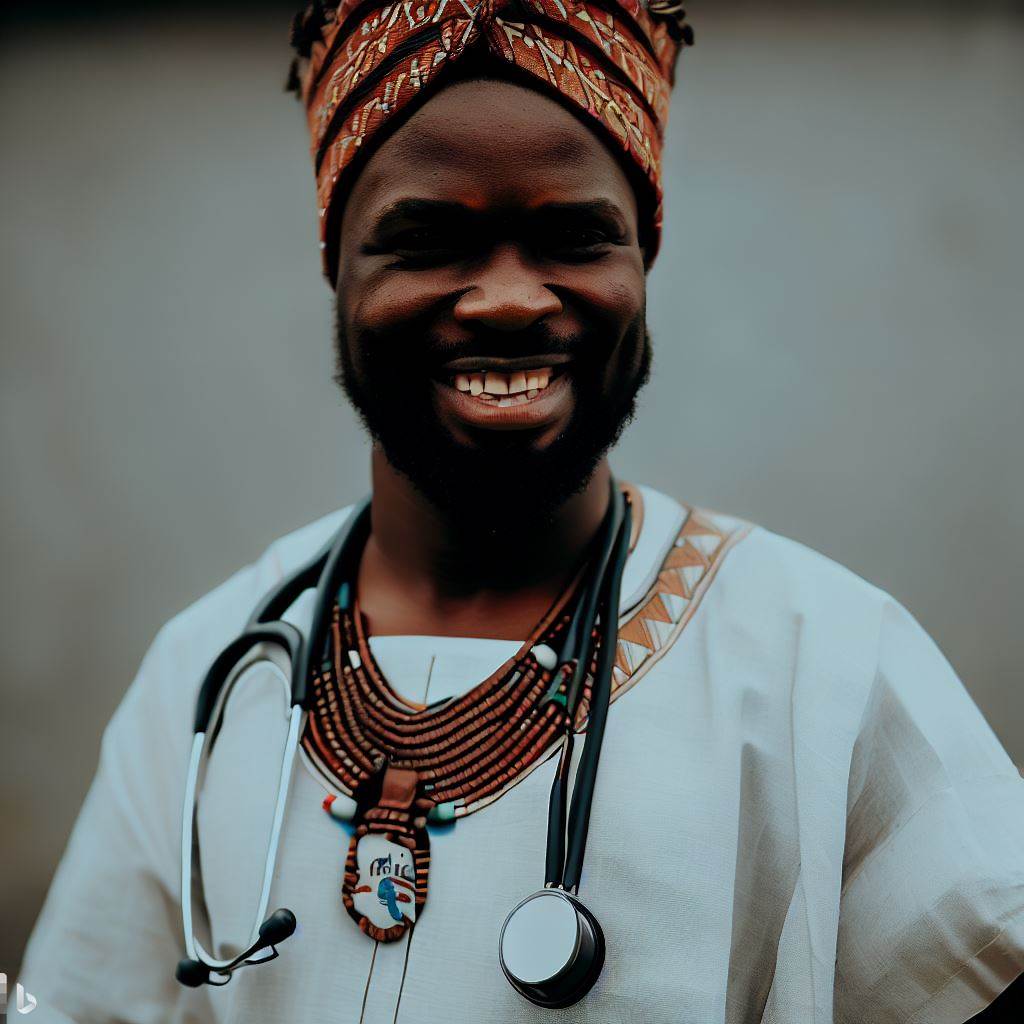Introduction
A Brief Overview of Modern and Traditional Therapies
Modern and traditional therapies are two different approaches to treating illnesses and maintaining overall health.
Modern therapies refer to the use of pharmaceutical drugs, surgery, and other medical interventions backed by scientific evidence.
Traditional therapies, on the other hand, often involve herbal remedies, spiritual rituals, and practices that have been passed down through generations.
Importance of Combining both Approaches in Nigeria
In Nigeria, there is a rich cultural heritage that values traditional therapies. Many people still rely on traditional healers and herbal medicines for their healthcare needs.
However, with advancements in medical science, modern therapies have become more accessible and effective. It is crucial to combine both approaches for several reasons.
Firstly, traditional therapies often provide a holistic approach to healing, taking into account the physical, mental, and spiritual aspects of a person.
This can complement modern therapies that predominantly focus on the physical body. By integrating traditional therapies, individuals can receive a more comprehensive and well-rounded treatment.
Secondly, combining modern and traditional therapies allows for a personalized and culturally sensitive approach to healthcare. Nigeria is a diverse country with a range of cultural practices and beliefs.
By incorporating traditional therapies, healthcare providers can respect the cultural values and preferences of their patients, enhancing trust and treatment outcomes.
Lastly, integration promotes collaboration and exchange of knowledge between modern and traditional practitioners.
It encourages mutual respect and understanding, leading to the development of new treatment models that can benefit both approaches.
This collaboration can also help identify potential interactions and risks when traditional and modern therapies are used side by side.
Basically, combining modern and traditional therapies in Nigeria is crucial for a more holistic, culturally sensitive, and effective approach to healthcare.
By acknowledging the strengths of both approaches, individuals can receive better treatment outcomes and promote overall well-being.
Traditional Therapies in Nigeria
In Nigeria, traditional therapies are deeply ingrained in the cultural fabric of the country.
Definition of traditional therapies
Traditional therapies refer to healing practices that have been handed down through generations, often rooted in indigenous knowledge.
These therapies encompass various methods, such as the use of herbal remedies, divination, and spiritual rituals.
Examples of traditional healing practices in Nigeria
- Herbal Medicine: Numerous plants and herbs are used to treat various ailments based on their medicinal properties.
- Massage and Manipulation: Techniques involving manual manipulation of the body for pain relief and relaxation.
- Divination: Traditional diviners consult spirits or deities to gain insight into the cause of illnesses and provide solutions.
- Cupping: A technique that uses heated cups to create suction on the skin, believed to promote healing.
- Scarification: The intentional creation of controlled scars on the body to address specific health conditions.
Cultural significance and relevance of traditional therapies
Traditional therapies hold great cultural significance and relevance in Nigerian society.
They are deeply connected to the cultural identities, beliefs, and values of various ethnic groups.
Traditional healing practices are considered holistic, addressing not only physical ailments but also spiritual and mental well-being.
These therapies provide a sense of community and belonging, as healing often occurs in communal settings.
Traditional healers are respected members of the community, revered for their knowledge, experience, and ability to bridge the spiritual and physical realms.
Furthermore, traditional therapies are often more accessible and affordable than modern medical treatments, particularly in rural areas.
However, it is essential to note that while traditional therapies have their merits, they are not without limitations.
There is a need for a balanced approach that combines the strengths of both traditional and modern therapies.
Collaboration between traditional healers and modern healthcare professionals can lead to more holistic and effective treatment approaches.
It is crucial to integrate traditional knowledge with evidence-based medicine to ensure the safety and efficacy of treatments.
This integration can pave the way for a comprehensive healthcare system that respects and preserves Nigeria’s rich cultural heritage while meeting the evolving health needs of its population.
Essentially, traditional therapies in Nigeria play a vital role in the cultural, social, and healthcare landscape.
By recognizing their significance and combining them with modern therapies, Nigeria can achieve a more inclusive and comprehensive healthcare system for the benefit of all its citizens.
Read: Exploring the Various Nursing Specialties in Nigeria
Modern Therapies in Nigeria
Introduction to modern therapeutic practices
Modern therapeutic practices have gained prominence in Nigeria, offering new ways to address mental health and well-being.
Nigeria has witnessed a surge in the adoption of modern therapies, reflecting a growing recognition of their effectiveness.
Therapies such as cognitive-behavioral therapy (CBT), psychoanalysis, and trauma-focused therapy aim to alleviate mental health issues.
Explanation of Western medicine and psychological therapies used in Nigeria
Western medicine, rooted in scientific principles, focuses on diagnosing and treating physical and mental illnesses through evidence-based practices.
Psychological therapies, including talk therapy, play a vital role in addressing mental health disorders by promoting self-awareness and emotional healing.
CBT, for instance, emphasizes changing negative thought patterns and behaviors to achieve positive outcomes.
Trauma-focused therapy helps individuals process and cope with traumatic experiences, fostering post-traumatic growth.
Although rooted in Western theories, these therapies have been adapted and localized to suit Nigerian cultural contexts.
Recognition of the benefits of modern therapies
Modern therapies offer several advantages that have been increasingly recognized in Nigeria.
They provide a structured and evidence-based approach to mental health treatment, ensuring a higher likelihood of successful outcomes.
Modern therapies also foster active participation from individuals in their own healing process, empowering them to take control of their mental well-being.
These approaches have proven effective in addressing various mental health conditions prevalent in Nigerian society.
Moreover, modern therapies help reduce stigma surrounding mental health, encouraging individuals to seek support without fear of judgment.
The integration of modern and traditional therapies in Nigeria is crucial in providing holistic care to individuals.
This blend acknowledges the cultural beliefs and practices deeply ingrained in Nigerian society, promoting acceptance and inclusion.
By combining modern and traditional therapies, practitioners aim to create a comprehensive treatment plan tailored to each individual’s needs.
In a nutshell, the adoption of modern therapeutic practices in Nigeria signifies a positive shift towards addressing mental health concerns more effectively.
The recognition of Western medicine and psychological therapies highlights the importance of evidence-based approaches in promoting well-being.
Combining modern and traditional therapies ensures inclusive and culturally sensitive care, fostering improved mental health outcomes in Nigeria.
Read: Career Paths for Massage Therapists in Nigeria
Challenges in Traditional Therapies
Lack of regulation and standardization in traditional therapies
Traditional therapies in Nigeria face challenges due to the lack of proper regulation and standardization.
Unlike modern therapies, traditional therapies often lack clear guidelines and oversight, leading to inconsistent practices and varying quality of care.
This lack of regulation can be attributed to several factors. Firstly, traditional therapies are deeply rooted in cultural beliefs and practices, making it difficult to impose external regulations without alienating communities.
Additionally, the government’s focus on modern medicine has overshadowed the need for regulating traditional therapies.
Without regulatory measures in place, practitioners of traditional therapies operate with varying levels of expertise, making it challenging for patients to identify qualified practitioners.
This lack of standardization raises concerns about the safety and effectiveness of traditional therapies.
Limited scientific evidence supporting the effectiveness of traditional therapies
Another challenge facing traditional therapies in Nigeria is the limited scientific evidence supporting their effectiveness.
Modern medicine emphasizes evidence-based practices, which involves rigorous testing and research to prove the efficacy of treatments.
Conversely, traditional therapies often lack scientific validation and rely on anecdotal evidence and historical practices.
This limited empirical evidence raises doubts among healthcare professionals and skeptics about the efficacy of traditional therapies.
Furthermore, the lack of scientific studies on traditional therapies limits potential collaborations and integration with modern medicine.
Without solid evidence, it becomes challenging to convince healthcare providers to incorporate traditional therapies into their practices.
Skepticism and misconceptions surrounding traditional therapies
Traditional therapies in Nigeria also face skepticism and misconceptions, hindering their widespread adoption and acceptance.
Some individuals view traditional therapies as outdated or even superstitious, dismissing their potential benefits.
The lack of awareness and education about traditional therapies contributes to misconceptions.
Many people are unaware of the depth and complexity of traditional healing practices, leading to misunderstandings about their nature and effectiveness.
Reliance on traditional therapies is often seen as an alternative option rather than a complementary approach to modern medicine.
This mindset limits the potential benefits of combining both traditional and modern therapies to provide holistic care for patients.
Efforts to address skepticism and misconceptions are crucial in order to harness the potential advantages of traditional therapies and encourage their integration into the healthcare system.
Education, awareness campaigns, and open dialogues between traditional healers and modern healthcare providers can help bridge gaps and promote a more comprehensive approach to patient care.
Read: The Journey of a Massage Therapist: Stories from Nigeria
Challenges in Modern Therapies
Limited access to modern therapies in rural areas
- Lack of medical facilities and specialized professionals hinder the availability of modern therapies.
- Rural communities face difficulties in accessing modern therapies due to geographical barriers.
- Limited infrastructure and inadequate transport systems make it challenging to reach modern therapy centers.
- Lack of awareness and education about modern therapies contribute to limited access in rural areas.
- Insufficient funding and government support result in a scarcity of modern therapy options in remote regions.
Cost and affordability of modern therapeutic practices
- Modern therapies often come with a hefty price tag, making them unaffordable for many individuals.
- High consultation fees, laboratory tests, and medication costs burden patients seeking modern therapies.
- The need for multiple sessions and long-term treatment plans can lead to financial strain.
- Health insurance coverage for modern therapies is limited, leaving individuals to bear the expenses themselves.
- Affordability issues cause individuals to opt for alternative therapies or not seek treatment at all.
Cultural barriers and stigmatization associated with seeking modern therapy
- Traditional beliefs and cultural norms discourage individuals from considering modern therapies.
- Society often stigmatizes individuals seeking modern therapies, labeling them as mentally unstable or weak.
- Fear of judgment and social isolation prevents many from openly discussing their mental health concerns.
- Traditional healers, who hold significant influence, promote traditional therapies over modern ones.
- Cultural misconceptions about modern therapies reinforce the existing barriers to seeking help.
Overcoming these challenges is vital to ensure the widespread adoption of modern therapies and improve mental health outcomes in Nigeria.
Read: Massage Therapy Schools and Certifications in Nigeria

The Power of Combining Both Approaches
Holistic approach to health and wellness
- Combining modern and traditional therapies offers a holistic approach to health and wellness.
- Traditional therapies focus on treating the underlying causes of illness rather than just symptoms.
- Modern interventions complement this approach by providing evidence-based treatments and advanced medical technology.
Enhancing the effectiveness of traditional therapies with modern interventions
- Modern interventions can enhance the effectiveness of traditional therapies by providing additional tools and resources.
- For example, modern diagnostics can help traditional healers accurately identify health issues.
- Additionally, modern medications and treatments can be used in conjunction with traditional remedies for better outcomes.
Mutual respect and collaboration between traditional healers and modern healthcare providers
- Combining modern and traditional therapies requires mutual respect and collaboration between healers and healthcare providers.
- Modern healthcare providers should appreciate the wisdom and cultural significance of traditional healing practices.
- Traditional healers can benefit from modern healthcare providers’ knowledge and resources, improving overall patient care.
By integrating modern and traditional therapies, Nigeria can address its healthcare challenges more effectively.
It allows for a holistic approach to health and wellness, addressing both the physical and spiritual aspects of individuals.
Traditional therapies emphasize treating the root causes of illness, while modern interventions provide scientific evidence and advanced technology to support their effectiveness.
Combining both approaches enhances the overall effectiveness of traditional therapies. Traditional healers can benefit from modern diagnostic tools to accurately identify health issues.
This collaboration ensures that patients receive appropriate treatments and enjoy better health outcomes.
Additionally, modern medicines and treatments can be used alongside traditional remedies to optimize results.
However, it is crucial to foster mutual respect and collaboration between traditional healers and modern healthcare providers.
Modern healthcare professionals should appreciate the wisdom embedded in traditional healing practices.
Recognizing the cultural significance of these therapies can lead to better understanding and cooperation between the two approaches.
At the same time, traditional healers can benefit greatly from modern healthcare providers.
They can learn new techniques, access modern medical knowledge, and leverage resources not available in traditional healing practices.
This collaboration can lead to improved patient care, ultimately benefiting the Nigerian healthcare system as a whole.
In short, combining modern and traditional therapies in Nigeria offers significant advantages. It allows for a holistic approach to health and wellness by addressing both the physical and spiritual aspects of individuals.
Modern interventions enhance the effectiveness of traditional therapies, and collaboration between healers and healthcare providers promotes better patient care.
Embracing this integrative approach can help Nigeria overcome its healthcare challenges and improve the well-being of its population.
Read: The Journey to Becoming a Registered Nurse in Nigeria
Success Stories in Nigeria
Examples of organizations or individuals successfully integrating modern and traditional therapies
- The African Traditional Medicine Research and Development Center has successfully combined traditional herbal remedies with modern medicine.
- Dr. Ayodele Odunayo has built a successful practice by incorporating both Western medicine and traditional healing methods.
- The Nigerian Association of Naturopathic Medicine has been instrumental in promoting the integration of traditional and modern therapies.
Impact on the community and individuals’ well-being
The integration of modern and traditional therapies in Nigeria has had a significant impact on the community and the well-being of individuals.
By combining both approaches, people have access to a wide range of treatment options that cater to their specific needs and beliefs.
This integration has also led to improved health outcomes and increased patient satisfaction. Many individuals have reported better control of their chronic conditions and a higher overall quality of life.
Additionally, the integration of traditional therapies has helped preserve cultural heritage and promote a sense of belonging among the population.
It allows people to maintain their traditional healing practices while benefiting from advancements in modern medicine.
Lessons learned from these success stories
- Open-mindedness and acceptance of different approaches are crucial for successful integration.
- Collaboration and partnerships between modern medical practitioners and traditional healers are essential.
- Evidence-based research should be conducted to validate the effectiveness and safety of traditional therapies.
- Public education and awareness campaigns are necessary to promote the benefits of combined therapies.
- Government support and policies that recognize and regulate traditional therapies are vital.
Challenges to Integrating Modern and Traditional Therapies
Resistance from traditional healers or modern healthcare providers
- Traditional healers may view modern therapies as a threat to their livelihood and cultural traditions.
- Modern healthcare providers may be skeptical of traditional therapies due to lack of scientific evidence.
- Both parties may fear a loss of credibility or status if they embrace the other’s therapies.
Lack of legislation or policies supporting integration
- Without clear guidelines or regulations, there may be confusion about the proper use and integration of therapies.
- Traditional therapies may not meet the standards and regulations set by modern healthcare systems.
- The absence of legislative support hampers collaboration and limits opportunities for research and funding.
Addressing the cultural and ethical considerations
- Different cultural beliefs and practices may clash, leading to challenges in integrating therapies.
- Researchers and policymakers must consider issues of consent, privacy, and potential harm when combining therapies.
- Balancing the rights of patients to choose their preferred therapies with ensuring their safety and well-being.
- Navigating the ethical implications of integrating modern and traditional therapies in healthcare settings.
In general, integrating modern and traditional therapies in Nigeria faces significant challenges.
Resistance from traditional healers and modern healthcare providers, lack of legislation or policies supporting integration, and addressing cultural and ethical considerations are the key hurdles to overcome.
However, with open dialogue, collaboration, and a commitment to finding common ground, it is possible to create a healthcare system that combines the best of both worlds for the benefit of all Nigerians.
Recommendations for Future Integrative Practices:
- Conduct education and awareness campaigns on benefits.
- Invest in evidence-based research to validate effectiveness.
- Foster collaboration between government, healthcare professionals, and traditional healers.
Integrative medicine gains momentum in Nigeria, combining modern and traditional therapies.
To enhance acceptance:
- Educate the public, professionals, and policymakers on benefits.
- Conduct rigorous studies to validate traditional healing practices.
- Collaborate to establish guidelines and regulations.
- Provide capacity building for traditional healers.
- Allocate resources and funding to integrative medicine programs.
By implementing these recommendations, Nigeria can achieve a patient-centered healthcare system that combines the best of modern and traditional therapies.
Delve into the Subject: Day in the Life: What It’s Like Being an Optometrist in Nigeria
You Might Also Like: The Impact of Sonography on Nigeria’s Healthcare System
Conclusion
- Recap of the importance of combining modern and traditional therapies in Nigeria.
- Hope for a more integrated and inclusive healthcare system.
- Call to action for further exploration and implementation of integrative practices in Nigeria.




